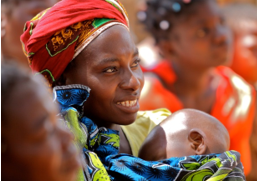Speeches Shim
BACKGROUND
The government of Mozambique has made progress in its efforts to combat malaria and address issues pertaining to Maternal, Newborn and Child Health (MNCH). However, malaria is still endemic throughout Mozambique, and its entire population of 26.4 million (2016) is at risk. Malaria is considered the most important public health problem in Mozambique and accounts for 29% of all deaths. Among children under five years of age, malaria accounts for 42% of deaths. Regarding MNCH, despite substantial improvements, preventable maternal and child deaths continue to be unacceptably high. Child mortality fell 37% between 2003 and 2011 and gains have continued. Infant mortality has fallen even further, by 50 percent between 2003 and 2011. Maternal mortality rates stagnated between 2003 and 2011; and in 2015, the percentage of institutional births increased from 63% to 70%. Using data to track and sharpen implementation, advancing quality, respectful care, strengthening health systems, and continuous learning are key to combating malaria and improving MNCH.
PROGRAM DESCRIPTION
The main objective of the program is to generate evidence to support the implementation of malaria and MNCH activities in Mozambique, by carrying out four key activities identified by USAID, the Ministry of Health (MOH), and CISM. In Mozambique, there are no regular studies monitoring the efficacy of antimalarial drugs in treatment of uncomplicated malaria, therefore, the aim of the study is to monitor the therapeutic efficacy and safety of antimalarial drugs in the treatment of malaria in children below five years in Cabo Delgado, Tete, Sofala, Gaza and Maputo provinces. The study also introduces and evaluates the impact of vaccines introduced to combat pneumonia, its long term effects, and public health benefits in children less than five years of age. The World Health Organization has recommended worldwide introduction of a vaccine to combat rotavirus (a contagious virus that can cause gastroenteritis, i.e. inflammation of the stomach and intestines). The activity assesses the impact of rotavirus vaccine in diarrheal associated hospitalization by rotavirus and the circulating genotypes. The final activity is an assessment of the safety of anti-retroviral drugs (ART) used during pregnancy on HIV positive women. The activity seeks to provide more information and data on the drug toxicity and their associated risk factor during pregnancy, as well as to improve the decision making process on selection of ART regimen to use during pregnancy.
EXPECTED RESULTS
The program will generate evidence that supports the implementation of malaria and MNCH activities in Mozambique. Preliminary and final results are disseminated through quarterly progress reports of each study to specific programs at MOH. Promulgation of results also takes place via oral presentations made by CISM investigators in the National Health Directorate.


Comment
Make a general inquiry or suggest an improvement.